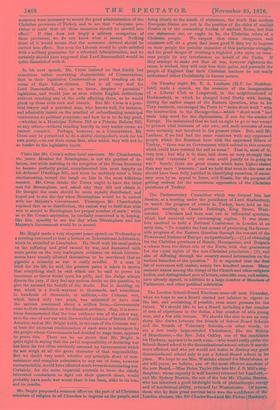Mr. Bright made a very eloquent peace-speech on Wednesday at
a meeting convened to hear a lecture on International Arbitration, which he attended at Llandudno. He dwelt with his usual pathos on the suffering and grief caused by war, and descanted with some power on the very inadequate evidence on which Govern- ments have usually allowed themselves to be convinced that so gigantic a calamity as war is really needful. If a man is tried for his life, he said, the greatest pains is taken to secure that everything shall be said which can be said to prove his innocence or throw doubt upon his guilt, and the Judge always directs the jury, if they feel any serious doubt on the question, to give the accused the benefit of the doubt. But in deciding on war, which is a death-warrant to thousands, and sometimes to hundreds of thousands, or millions,—the Crimean war, which lasted only two years, was estimated to have cost the nations concerned about a million lives,—Governments come to their resolution on the flimsiest evidence. Nay, it is some- times demonstrated that the true evidence was all the other way, as in the case of our war with the revolted colonies of British North America, and as Mr. Bright holds, in the case of the Crimean war ; at least the universal condemnation of such wars in retrospect by the people whose Governments had decided to wage them, appears to prove this. There can be no doubt that Mr. Bright is quite right in saying that the awful responsibility of declaring war has been far too often carelessly assumed by Governments which do not weigh at all the grave character of that responsibility. But we doubt very much whether any principle short of non- resistance and complete submission to any we of force, however unwarrantable, would have effected much towards terminating war. Certainly, for the mere impartial neutrals to leave the chiefly interested combatants to fight out their quarrels alone, would probably have made war worse than it has been, alike in its tone and its results.






































 Previous page
Previous page